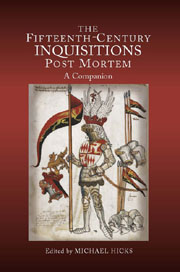Book contents
- Frontmatter
- Contents
- List of Tables and Figures
- List of Contributors
- Preface
- Glossary
- Abbreviations
- 1 Introduction
- 2 Crossing Generations: Dower, Jointure and Courtesy
- 3 The Lesser Landowners and the Inquisitions Post Mortem
- 4 Tales of Idiots, Signifying Something: Evidence of Process in the Inquisitions Post Mortem
- 5 The Value of Fifteenth-Century Inquisitions Post Mortem for Economic and Social History
- 6 ‘Notoriously Unreliable’: The Valuations and Extents
- 7 The Descriptions of Land Found in the Inquisitions Post Mortem and Feet of Fines: A Case Study of Berkshire
- 8 Re-assessing Josiah Russell's Measurements of Late Medieval Mortality using the Inquisitions Post Mortem
- 9 A Great Historical Enterprise: The Public Record Office and the Making of the Calendars of Inquisitions Post Mortem
- 10 Writs and the Inquisitions Post Mortem: How the Crown Managed the System
- 11 ‘Thrifty Men of the Country’? The Jurors and Their Role
- 12 Place-Names and Calendaring Practices
- Index
3 - The Lesser Landowners and the Inquisitions Post Mortem
Published online by Cambridge University Press: 05 February 2013
- Frontmatter
- Contents
- List of Tables and Figures
- List of Contributors
- Preface
- Glossary
- Abbreviations
- 1 Introduction
- 2 Crossing Generations: Dower, Jointure and Courtesy
- 3 The Lesser Landowners and the Inquisitions Post Mortem
- 4 Tales of Idiots, Signifying Something: Evidence of Process in the Inquisitions Post Mortem
- 5 The Value of Fifteenth-Century Inquisitions Post Mortem for Economic and Social History
- 6 ‘Notoriously Unreliable’: The Valuations and Extents
- 7 The Descriptions of Land Found in the Inquisitions Post Mortem and Feet of Fines: A Case Study of Berkshire
- 8 Re-assessing Josiah Russell's Measurements of Late Medieval Mortality using the Inquisitions Post Mortem
- 9 A Great Historical Enterprise: The Public Record Office and the Making of the Calendars of Inquisitions Post Mortem
- 10 Writs and the Inquisitions Post Mortem: How the Crown Managed the System
- 11 ‘Thrifty Men of the Country’? The Jurors and Their Role
- 12 Place-Names and Calendaring Practices
- Index
Summary
During the last thirty years or so one of the largest areas of growth in medieval English history has been the study of the lesser landowners, or, to use the anachronistic but convenient term, the gentry. Although this kind of study has now reached back to the thirteenth century, the original impetus for its appearance was the revolution brought about by the work of K.B. McFarlane, the man who transformed the history of England in the fourteenth and, especially, the fifteenth centuries. McFarlane's work on the nobility and their ‘bastard feudal’ gentry followings invited exploration of the gentry and of the localities in which most of the gentry spent their political and governmental lives. More than that, McFarlane himself realised the importance of extending the study of politics and landed society socially downwards from the nobles and politically outwards from Westminster. Work on the gentry has therefore been mostly on the ‘McFarlane centuries’ and, within these, on the period from the later fourteenth century. Most, though not all, of this work has been carried out through the medium of the county, a methodology borrowed from the early modern historians who pioneered the study of the gentry. The abiding difficulty for historians of this subject in the late medieval period is the lack of really informative sources. Outside the four correspondences, themselves variable in size and in their usefulness to the historian, we have virtually no intimate access to the thoughts and intentions of the gentry.
- Type
- Chapter
- Information
- The Fifteenth-Century Inquisitions 'Post Mortem'A Companion, pp. 47 - 78Publisher: Boydell & BrewerPrint publication year: 2012



